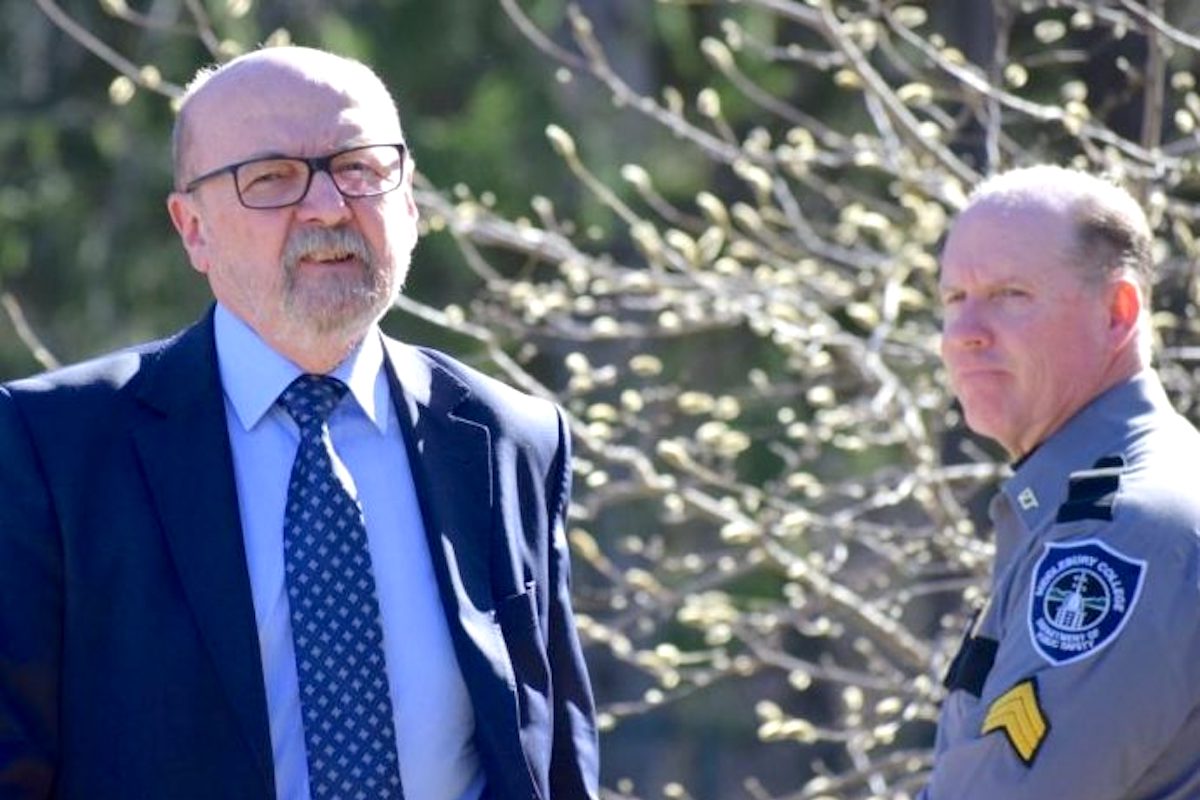Education
What I Saw at Middlebury College
Putting aside the ideological and political attitudes at play, there is a social component as well: Never in my life have I witnessed so many arrogant, needy, spoiled brats on parade.

“At a meeting last week at Middlebury College, students upset and angry that conservative Ryszard Legutko had been invited to speak on campus were calmed and reassured by three administrators who apologized to the students for their feelings of discomfort, agreed that they had every right to feel aggrieved, and assured them there’s steps underway to ensure controversial right-wing speakers are not easily invited to campus in the future,” reported Jennifer Kabbany of The College Fix this week. “That according to a 40-minute recording of the meeting recorded surreptitiously by a student in the room…who said the three administrators at the meeting were Sujata Moorti, the incoming dean of the faculty, as well as Dean of Students, Baishakhi Taylor, and Renee Wells, director of education for equity and inclusion.”
The “student in the room” cited in this report—that was me. But before I discuss the controversy over Legutko, let me offer a brief flashback to February 6, 2019.
At the time, I was beginning my first semester of college as what Middlebury calls a “Feb”: Along with about 80 or 90 classmates, I was beginning my college education a semester late. I moved in while most of the campus was away on break, and spent the week getting to know the other Feb freshmen. It was essentially a week full of fun activities and bonding on an idyllic private liberal-arts college campus in rural Vermont. Along with everyone else, I was encouraged to believe that this is what the whole Middlebury experience would be like. And maybe, in times of yore, it was. But not in this era, when students are encouraged to experience campus life as one long sequence of ideologically-inflicted psychic traumas.
The tenor of intellectual life was established in March, a few weeks after I arrived, when the student newspaper, The Middlebury Campus, published an article entitled, White Allies Asked to Support Eliminating White Supremacy in Curriculum, which described a standing-room only gathering of Middlebury students concerned about “the need to eliminate racial violence from the Middlebury curriculum.” The organizer told the crowd that “the academic institution is the greatest mobilizer of white supremacy.” The event called for the “decolonization” of the academic curriculum, and elicited testimonials such as “the violence we experience in the classrooms is truly across disciplines.”

A few weeks after that, we all got an email from the college President, informing us that a Middlebury chemistry professor had been placed on leave because he had asked students to calculate a lethal dose of hydrogen cyanide gas—the theory being that the subject had Nazi connotations. According to the email, these complaints had triggered “an inquiry into past examinations” administered by the same professor, which in turn uncovered a joking reference to the Ku Klux Klan. This was deemed to be “offensive,” if not racist “in effect.” Another professor is also being investigated for a cartoon that was posted in a slide, which featured characters rowing a large boat, with another man tied to the hull of the ship, alongside the words “the better equipped slave ships, of course, always carried a spare.”
These stories all attracted some measure of attention. But things went to another level earlier this month, in advance of an April 17 speaking engagement by the aforementioned socially conservative Polish professor, Ryszard Legutko, who’d been invited to talk about his recent book, The Demon in Democracy: Totalitarian Tendencies in Free Societies.
In the days leading up to the event, the campus was in an uproar, with posters advertising the event vandalized with words such as “homophobe” and “bigot.” A group of students created a (now archived) Facebook group titled Ryszard Legutko is a f*cking homophobe (and racist and sexist). Their stated intention was to peacefully protest the event through various means, such as handing out pamphlets detailing Legutko’s socially conservative views, and hosting a pride rally outside the venue.
The administration, fearful of violent protest, changed the location of the venue three times. Ultimately, they cancelled it—something the Facebook protestors hadn’t even asked them to do—just hours before it was set to start, attributing the decision to “safety concerns.” Amazingly, the school sent this email out before informing Professor Legutko of the cancellation.
The cancellation caused the campus to erupt. I saw students literally celebrating in the halls, while others who wanted to listen to Legutko speak sent out angry text messages. About an hour later, I received a message from a friend, urging me to head to the college’s conference center as soon as possible. As I headed over, he explained that Professor Legutko was indeed on campus, and would be giving his talk to a political-science class. I learned that students in the class had unanimously voted in support of his appearance.
When I entered the room, there was probably about 25 students in attendance, but that number exceeded 40 by the time the event was over. (The numbers here are small, but the entire Middlebury student body consists of only about 2,500 students—the size of a large high school.) Eventually, someone at the campus newspaper got word of the event, and began to livestream it from a Facebook account. A professor told them to stop recording his class, and Professor Legutko subsequently left the conference room with a security detail as a crowd of about half a dozen student protestors looked on passively. He was then escorted off of campus.
As I was leaving the conference room, another text message came in—this one about an “emergency” meeting for students and administrators. Naively imagining that this might be an opportunity for students of all viewpoints to speak their mind about the episode, I walked over. Upon entering that room, however, I realized this would be a very different kind of meeting.
As my recording of the event shows, it was a call-and-response performance starring outraged protestors and three highly sympathetic administration members—two of them being both deans and gender studies professors. The whole thing resembled a modern day Struggle Session, with kids literally weeping over the “violence” that supposedly had been brought to campus through the vessel of Legutko. The response of the administrators was an endless expression of sympathy and guilt, as well as pledges to make things right. The students actually demanded that the administrators take notes. And like an obedient underling, one of the professors whipped out her phone to record every demand (all of which were subsequently published in manifesto form).
The three faculty members spoke openly about their desire to block speakers with certain viewpoints from coming to campus, and discussed plans for an extensive background-check scheme that would allow Middlebury officials to systematically analyze speakers beforehand. I recorded all of this because I’m passionate about free speech—and I felt it was my duty to show other students that members of their own administration were explicitly advocating for a system that would allow them to restrict speech on campus in accordance with their own privately held biases.
After about an hour, three more college officials entered the room, and students again jumped up to the whiteboard to list their demands. At this point, I felt I had seen enough and decided to go home, where I listened to the 40 minutes of audio I’d recorded. I was stunned by the realization that the school was no longer run according to any coherent set of ideas set down by the administration, but rather by the knee-jerk diktats of a small group of radicalized students operating in open alliance with like-minded staffers.
Fighting this madness meant exposing it, which is why I published the audio recording. As a first step, I sent the tape to “renegade” scholar James Lindsay and filmmaker Mike Nayna, who’d become well-known thanks to the 2017-2018 Sokal-Squared hoax. Nayna posted a short-form video on his YouTube account, which as of this writing has more than 35,000 views.
On Tuesday, Middebury’s Student Government Association (SGA) sent out a 13-point codified list of the demands that I’d first heard in the April 17 meeting I’d recorded. This included the demand that “a due diligence form” be required by the Office of Institutional Diversity, Equity, and Inclusion” in regard to all speakers invited to campus—the purpose being to “determine whether a speaker’s beliefs align with Middlebury’s community standards.” The SGA also demanded “recurrent bias training to be provided to all hired staff, faculty, administrators, as well as all students,” with “the names of any faculty, staff, or administration members who do not participate in bias training to be made publicly available to all students.” (Also: “In this bias training, participants must learn about the importance of preferred gender pronouns. All faculty must ask students’ names and pronouns on the first day of each new semester, and preferred names and pronouns must be respected.”) Furthermore, the SGA insisted on “a strategic plan to hire more counselors who are femme, of color, and/or queer and provide a more robust health service for transitioning people to be created,” plus the “development of a Black Studies department,” with “appropriate funding allocated to the department, and sufficient tenure track positions.” The manifesto concluded with the pledge that “if tangible plans to implement these proposals are not released, a majority of SGA senators will resign such that the SGA Senate will no longer be able to quorum, effectively dissolving the body.”

This is not the first time that Middlebury has been at the center of this sort of controversy: In 2017, a group of students shut down a speaking appearance by Charles Murray, generating a fracas that led to the injury of faculty member Allison Stranger and the disciplining of dozens of protestors. That happened while I was still in high school. But even during my short time at college, I have been shocked at the values that inform campus culture at Middlebury and other supposedly “elite” schools. When we lament the brainwashing and indoctrination that takes place in literary, activist and corporate circles—as well as on social media—it is important to remember that places such as Middlebury are where these authoritarian attitudes first germinate.
Putting aside the ideological and political attitudes at play, there is a social component as well: Never in my life have I witnessed so many arrogant, needy, spoiled brats on parade. And it is shocking to see these specimens presume to lecture the adults who run their school—and to do so successfully. My hope is that by helping to expose this phenomenon, I can help others find a way to fight the campus authoritarians and restore Middlebury—and the many other schools like it—to their proper role as places of education, not bullying and indoctrination.






